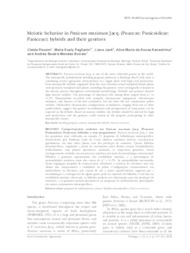Meiotic behavior in Panicum maximum Jacq. (Poaceae: Panicoideae: Paniceae): hybrids and their genitors.
Meiotic behavior in Panicum maximum Jacq. (Poaceae: Panicoideae: Paniceae): hybrids and their genitors.
Autoria: PESSIM, C.; PAGLIARINI, M. S.; JANK, L.; KANESHIMA, A. M. de S.; BONATO, A. B. M.
Resumo: Panicum maximum Jacq. is one of the most cultivated grasses in the world. The intraspecific hybridization breeding program underway at Embrapa Beef Cattle aims at combining several agronomic characteristics in a single plant with high seed production. Four intraspecific hybrids originated from the cross between sexual tetraploid female plants with apomictic tetraploid male plants, including the genitors, were cytologically evaluated in the meiotic process throughout conventional methodology. Hybrids and genitors showed high meiotic stability. The percentage of abnormal cells among them ranged from 6.7 to 14.2%. Abnormalities recorded were irregular chromosome segregation, chromosome stickiness, and absence of the first cytokinesis, but the latter did not compromise pollen viability. Multivalent chromosome configurations at diakinesis, ranging from one to three quadrivalents, suggest that genetic recombination and introgression of some genes can be expected in the hybrids. Based on meiotic stability, the hybrids should be selected for high seed production, and the genitors could remain in the program participating in other intraspecific crosses.
Ano de publicação: 2010
Tipo de publicação: Artigo de periódico
Unidade: Embrapa Gado de Corte
Observações
1 - Por padrão são exibidas publicações dos últimos 20 anos. Para encontrar publicações mais antigas, configure o filtro ano de publicação, colocando o ano a partir do qual você deseja encontrar publicações. O filtro está na coluna da esquerda na busca acima.
2 - Para ler algumas publicações da Embrapa (apenas as que estão em formato ePub), é necessário ter, no celular ou computador, um desses softwares gratuitos. Sistemas Android: Google Play Livros; IOS: iBooks; Windows e Linux: software Calibre.
Acesse outras publicações
Acesse a Base de Dados da Pesquisa Agropecuária (BDPA) para consultar o acervo completo das bibliotecas da Embrapa.

